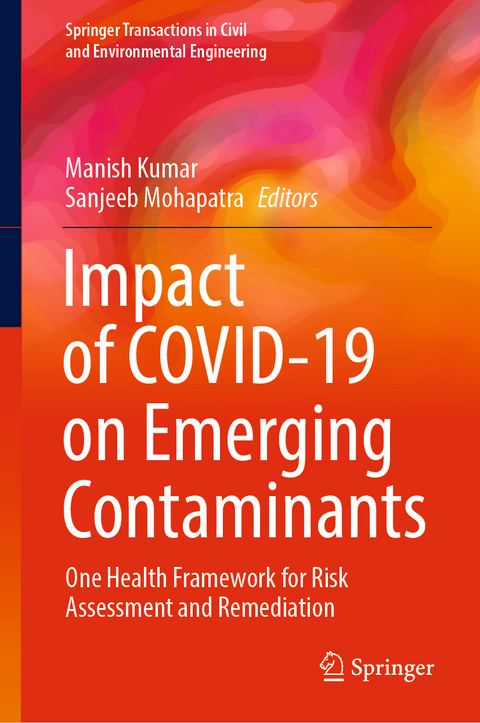
Impact of COVID-19 on Emerging Contaminants
Springer Verlag, Singapore
978-981-19-1846-9 (ISBN)
The book brings out several unique perspectives of impacts of COVID-19 on the environment with special emphasis on the risk and remediation of emerging contaminants. Idea is to work out under the one health framework and comprehend not only scientific and technical aspects but also environmental, legal and policy aspects for water resources management. The obvious stress is given to the occurrence, fate and transport of geogenic, microbial and anthropogenic contaminants of emerging concern under the preview of the fact that antibiotic and antiviral use has been unprecedented during the global pandemic of COVID-19. At the same time, this edited volume touches upon the broader framework of integrated water resource management, as well as mitigation and removal strategies to put forward a holistic picture to the readers and policymakers. These contents are divided into three sections: a) monitoring, occurrence, distribution and fate of emerging contaminants; b) source and effects of these contaminants on the total environment; and c) treatment strategies, natural attenuation and mitigation.
Dr. Manish Kumar is a Professor and Head of the Sustainability Cluster at School of Engineering, University of Petroleum and Energy Studies, Dehradun, Uttarakhand, India. He is Ph.D in Urban Engineering from the University of Tokyo, Japan, and has received several prestigious recognitions/fellowship, such as Water Advanced Research and Innovation (WARI) Fellowship, Japan Society for the promotion of Science (JSPS) foreign research fellowship, Brain Korea (BK)-21 post-doctoral fellowship, Monbukagakusho scholarship, Linnaeus-Palme stipend from SIDA, Sweden, Research Fellowship from CSIR, India and others. Prof. Kumar is active in the fields of contaminant transport and modeling, heavy metal speciation and toxicity, wastewater surveillance, emerging contaminants and water supply. He has over 200 publications to his credit. He is a Fellow of Royal Society for Chemistry (FRSC), London, UK. He is among the top 2% of researchers as per the list of Stanford University, USA.His ResearchGate score is above 97.5 percentile of the researchers in the world. Dr. Sanjeeb Mohapatra after finishing his Ph.D. degree at Environmental Science and Engineering Department, Indian Institute of Technology (IIT) Bombay, India, joined the National University of Singapore (NUS), Singapore, to pursue his postdoctoral degree. His research interest broadly covers the monitoring of emerging contaminants (ECs), photo-degradation and enzymatic degradation of ECs, and the role of dissolved organic matter in deciding the fate of such contaminants. He is a recipient of the Water Advanced Research Innovation (WARI) Fellowship awarded by the Department of Science and Technology (DST), India, University of Nebraska Lincoln, USA, Daugherty Water for Food Global Institute (DWFI), USA and Indo-U.S. Science and Technology Forum (IUSSTF). He is a recipient Newton-Bhabha Fellowship jointly awarded by Department of Scienceand Technology (DST), Government of India, and British Council, U.K and DST-INSPIRE fellowship offered by DST, India. Dr. Mohapatra also won several international and local awards for his research work for the last couple of years and has many publications in reputed journals, book chapters, and refereed conferences to his credit.
COVID-19 and antimicrobial resistance: A coincidental correlation.- WBE role in COVID-19 management: An perspective of European Union perspective.- Temporal variation of WBE: How can it be meaning fully used?.- Pathways of antiviral resistance in post-covid anthropocene.
| Erscheinungsdatum | 27.05.2022 |
|---|---|
| Reihe/Serie | Springer Transactions in Civil and Environmental Engineering |
| Zusatzinfo | 55 Illustrations, color; 11 Illustrations, black and white; XXV, 427 p. 66 illus., 55 illus. in color. |
| Verlagsort | Singapore |
| Sprache | englisch |
| Maße | 155 x 235 mm |
| Themenwelt | Studium ► Querschnittsbereiche ► Prävention / Gesundheitsförderung |
| Naturwissenschaften ► Biologie ► Ökologie / Naturschutz | |
| Naturwissenschaften ► Geowissenschaften ► Hydrologie / Ozeanografie | |
| Technik ► Umwelttechnik / Biotechnologie | |
| Schlagworte | Emerging Pollutants and Anthropocene • Management Strategies Isues • Remediation and Perception Issues • Surface and Groundwater Quality Issues • Water Quality Under the Pandemic |
| ISBN-10 | 981-19-1846-5 / 9811918465 |
| ISBN-13 | 978-981-19-1846-9 / 9789811918469 |
| Zustand | Neuware |
| Informationen gemäß Produktsicherheitsverordnung (GPSR) | |
| Haben Sie eine Frage zum Produkt? |
aus dem Bereich


